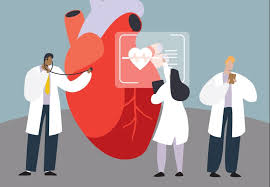Discover Top Cardiologists for Heart Health
Introduction
In a world where heart health is becoming increasingly important, finding the right cardiologist can make all the difference. This article is your ultimate guide to discovering top cardiologists for heart health. We will delve into the key factors to consider, the importance of choosing the right specialist, and provide you with valuable insights to make an informed decision about your cardiac care.
Why Your Heart Health Matters
Your heart is the powerhouse of your body, pumping blood and oxygen to every organ and tissue. Maintaining a healthy heart is essential for overall well-being and longevity. To ensure your heart is in top-notch condition, it’s crucial to have a trusted cardiologist by your side.
The Role of a Cardiologist
Understanding the Cardiologist’s Role
Cardiologists are medical professionals specialized in diagnosing and treating heart-related conditions. They play a pivotal role in safeguarding your heart health.
Types of Cardiologists
There are different types of cardiologists, including general cardiologists, interventional cardiologists, and electrophysiologists. Each specializes in specific areas of heart care.
Diagnostic Procedures
Cardiologists employ various diagnostic procedures, such as ECG, echocardiograms, and stress tests, to assess your heart’s condition accurately.
Treatment Options
Depending on the diagnosis, cardiologists offer a range of treatments, from medication and lifestyle changes to surgical interventions like angioplasty and bypass surgery.
Choosing the Right Cardiologist
Importance of Choosing Wisely
Selecting the right cardiologist is a critical decision. Their expertise can significantly impact your heart health journey.
Referrals and Recommendations
Seek recommendations from your primary care physician or friends and family who have had positive experiences with cardiologists.
Research and Credentials
Ensure your chosen cardiologist is board-certified and has a solid track record in treating heart conditions.
Communication and Comfort
A strong doctor-patient relationship is vital. Choose a cardiologist with whom you can communicate openly and feel comfortable discussing your concerns.
Discovering Top Cardiologists
Top Cardiologists Near You
Start by searching for top cardiologists in your local area or within a reasonable distance.
Online Reviews and Ratings
Websites and platforms like Healthgrades and Yelp provide valuable insights into patient experiences and satisfaction.
Hospital Affiliations
Consider cardiologists affiliated with reputable hospitals known for cardiac care excellence.
Consultation and Second Opinions
Don’t hesitate to schedule initial consultations with prospective cardiologists to gauge their compatibility with your needs. Seeking a second opinion is also a wise choice in complex cases.
Conclusion
In conclusion, your heart health is of utmost importance, and choosing the right cardiologist can be a life-changing decision. By following the guidelines mentioned in this article, you can confidently discover top cardiologists who will guide you on your journey towards a healthy heart.
FAQs
- How often should I see a cardiologist for a check-up?It’s generally recommended to schedule a routine check-up with a cardiologist annually, especially if you have known risk factors like high blood pressure, diabetes, or a family history of heart disease. However, the frequency of visits may vary based on your individual health profile. Your primary care physician can help determine the optimal schedule for your heart health check-ups. Regular visits are essential for early detection and prevention of heart-related issues.
- What are some common signs of heart problems?Heart problems can manifest in various ways, and it’s crucial to be aware of common warning signs. These may include:
- Chest pain or discomfort, often described as pressure, squeezing, or heaviness.
- Shortness of breath, especially with physical activity or at rest.
- Palpitations, which are irregular heartbeats or a rapid heart rate.
- Unexplained fatigue, even after adequate rest.
- Swelling in the ankles, feet, or abdomen.
- Dizziness or lightheadedness.
- Are all cardiologists equally qualified?No, cardiologists can have varying levels of expertise and specialization. When selecting a cardiologist, consider factors such as their board certification, years of experience, and specialization. Board certification indicates that a cardiologist has met the highest standards of education and training in the field. Additionally, you may want to seek recommendations and reviews from trusted sources, such as your primary care physician, friends, or family members who have had positive experiences with cardiologists.
- Can I prevent heart problems through lifestyle changes alone?In many cases, adopting a heart-healthy lifestyle can significantly reduce the risk of heart problems or manage existing conditions. Key lifestyle changes include:
- Eating a balanced diet rich in fruits, vegetables, whole grains, lean proteins, and low in saturated and trans fats.
- Engaging in regular physical activity, such as brisk walking, jogging, or swimming.
- Maintaining a healthy weight.
- Managing stress through relaxation techniques like meditation or yoga.
- Avoiding smoking and limiting alcohol consumption.
- Is heart surgery always necessary for heart conditions?Heart surgery is not always the first or only option for treating heart conditions. Many heart problems can be managed effectively with non-invasive treatments, medications, and lifestyle modifications. Cardiologists will recommend surgery when it is deemed necessary based on the severity and type of heart condition. It’s essential to have a thorough discussion with your cardiologist to explore all available treatment options and make an informed decision about your cardiac care.

